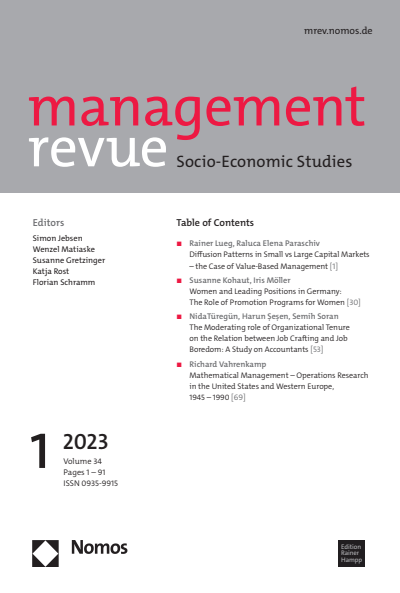人力资源管理系统与工作投入:探讨员工家长式价值观的影响
IF 1.7
0 MANAGEMENT
引用次数: 5
摘要
组织实施高承诺的人力资源管理(HRM)系统来增加工作投入,因为它们为员工提供了在工作场所被照顾的感觉。这种关系很少被认为是与管理层的责任一起,在工作场所之外照顾员工,以回报他们的辛勤工作和忠诚,这是家长式价值观的体现。因此,本研究调查了高承诺人力资源管理系统对工作投入的影响,其中介是员工认为人力资源管理系统是独特的、一致的和共识的(即,一个强大的系统),并受到员工对家长式价值观的信念的调节。基于对384名员工的实证研究,高承诺的人力资源管理可以增加工作投入。然而,人力资源管理系统强度并没有像预期的那样调解这种关系,而是与较低的工作投入水平相关联。当测试员工对家长式价值观信念的调节作用时,当家长式价值观信念较低时,高人力资源管理系统强度导致较低的工作投入水平。这些发现表明,对于不相信家长式价值观的员工来说,强大的人力资源管理系统可能被认为是侵入性的,就像家长式作风一样。本文章由计算机程序翻译,如有差异,请以英文原文为准。
Human Resource Management Systems and Work Engagement: Exploring the Impact of Employee Paternalistic Values
Organizations implement high-commitment human resource management (HRM) systems to increase work engagement as they provide employees with a sense of being looked after in the workplace. This relationship is rarely considered alongside the responsibility of management to look after employees beyond the workplace too in return for hard work and loyalty, as represented by paternalistic values. This study, therefore, investigates the effect of high-commitment HRM systems on work engagement, mediated by employees perceiving the HRM system to be distinctive, consistent, and consensual (i.e., a strong system), and moderated by employee belief in paternalistic values. Based on an empirical study of 384 employees, high-commitment HRM is found to increase work engagement as hypothesized. However, HRM system strength does not mediate this relationship as expected and instead is associated with lower levels of work engagement. When testing for the moderating effect of employee belief in paternalistic values, when this is low, high HRM system strength leads to lower levels of work engagement. These findings imply that strong HRM systems may be perceived as intrusive, as paternalism may be, for employees with low belief in paternalistic values.
求助全文
通过发布文献求助,成功后即可免费获取论文全文。
去求助
来源期刊

Management Revue
MANAGEMENT-
CiteScore
1.20
自引率
0.00%
发文量
7
期刊介绍:
Management Revue - Socio-Economic Studies is an interdisciplinary European journal that undergoes peer review. It publishes qualitative and quantitative work, along with purely theoretical papers, contributing to the study of management, organization, and industrial relations. The journal welcomes contributions from various disciplines, including business and public administration, organizational behavior, economics, sociology, and psychology. Regular features include reviews of books relevant to management and organization studies.
Special issues provide a unique perspective on specific research fields. Organized by selected guest editors, each special issue includes at least two overview articles from leaders in the field, along with at least three new empirical papers and up to ten book reviews related to the topic.
The journal aims to offer in-depth insights into selected research topics, presenting potentially controversial perspectives, new theoretical insights, valuable empirical analysis, and brief reviews of key publications. Its objective is to establish Management Revue - Socio-Economic Studies as a top-quality symposium journal for the international academic community.
 求助内容:
求助内容: 应助结果提醒方式:
应助结果提醒方式:


